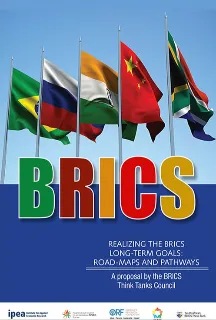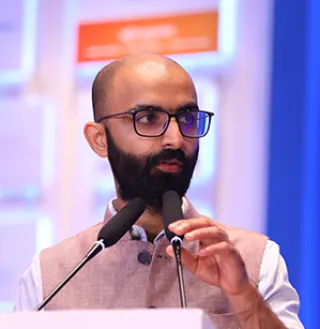2015 was a pivotal year with countries signing the United National General Assembly’s Post-2015 Development Agenda and the holding of the Conference of Parties 21 (COP21) in Paris. In 2016, the norms and frameworks around international trade were significantly altered as the World Trade Organisation continued to be weakened and new trading regimes flourished. This two year period also witnessed dramatic shifts in international security with countries across geographies facing the impact of increasing radicalisation and extremism. Given this reality, the BRICS Think Tank Council (BTTC) members agreed that the BRICS nations should play an even more critical role than before in ensuring economic prosperity of the developing and emerging community at large, and in establishing peace and stability of the international order.
This project is a continuation of the proposal made by the BTTC Members in 2015 titled “Towards a Long Term Strategy for BRICS”. Under the Russian Presidency in 2015, BTTC members decided to build on the theoretical perspectives brought out in the proposal and put forth practical and implementable models for BRICS cooperation. This project, like its predecessor, focuses on five pillars:
- Promoting cooperation for economic growth and development,
- Political and economic governance,
- Social justice, sustainable development and quality of life,
- Peace and security, and
- Progress through sharing knowledge and innovation.
The BTTC members decided that each of the five think tanks — one from each member nation — that would undertake the project, would author a chapter on one of the five pillars. These chapters were then shared with all five members for their inputs and suggestions, making them a collaborative and peer-reviewed process. Topic 1 was taken up by the China Centre for Contemporary World Studies; Topic 2 by the Observer Research Foundation, India; Topic 3 by the South Africa BRICS Think Tank; Topic 4 by the Russian National Committee on BRICS Research; and Topic 5 by the Institute for Applied Economic Research, Brazil.
This joint activity of the BTTC seeks to inform the governments of member countries about areas of mutual benefit, both from an economic and strategic perspective, and provide pathways to achieving the goals set.
The chapter on Promoting Cooperation for Economic Growth and Development identifies a range of sectors where knowledge sharing and mutual cooperation between member nations can lead to mutual prosperity. It provides for expanding the scope of intra-BRICS trade, both in commodities and services; it details how intra-BRICS investment can be increased, and how BRICS nations
can plug themselves into global value chains. The chapter also highlights how members can cooperate in critical sectors such as agriculture, infrastructure development, and small and medium sized enterprises.
The chapter on Political and Economic Governance uses a regime complex model to define the nature of the BRICS grouping. The chapter outlines key developments in the global political and economic space over the past one year, as well as the challenges going forward. On economic governance, the authors recommend that BRICS should push for greater linkages with the WTO and the Bretton-Woods institutions — the International Monetary Fund (IMF) and the World Bank. They argue that BRICS must jointly seek the incorporation of new rules of the monetary game – aimed at protecting emerging markets (EMs) and least developed countries (LDCs) — at the IMF itself. On political governance, a case has been made for reform of the United Nations Security Council. The authors also make a case for greater coordination of BRICS members on new frontiers such as cyberspace and outer space, given their successful collaboration on climate change at the COP 21.
The chapter on Social Justice, Sustainable Development and Quality of Life recognises BRICS as more than just a “growth alliance”, and sees its efforts as social and political imperatives that influence the broader societies of the five BRICS countries and across the global South. Second, as envisaged in the 2015 BRICS declaration at its meeting in Ufa, Russia, it recognises that cooperation between the five BRICS countries is mutual and premised on a shared and common vision of an alternative world economic and development system that is sensitive to the
interests of the South. Therefore, the authors argue, it becomes important that the BRICS nations develop a methodology to uniformly measure their progress over time and a set of development indicators through which such progress can be assessed. Aligned to these development indicators should be a set of well-defined targets that are both unambiguous and measureable towards the attainment of, among others, the 2030 Long Term Strategic ideals. Each BRICS nation should be in a position to annually report its progress against the set indicators and targets.
The chapter on Peace and Security argues that BRICS should strive to create a new order based not on the notion of exclusivity, but on principles of inclusivity and indivisibility of security for all, cooperative and sustainable security behaviour, and sovereign equality of all states. It recognises the nexus between peace, security and development. It makes a case for cooperation among BRICS members to ensure that the international system is based on supremacy of international law and norms rather than the use of force.
The chapter on Progress through Sharing Knowledge and Innovation recommends that BRICS members should facilitate visas for researchers by making special arrangements such as a BRICS researchers’ exchange. It also identifies specific areas of research such as public-private partnerships, and comparative assessment of financing options, particularly in the context of start-ups. It also provides policy insights into how BRICS can strengthen cooperation under the Patent Cooperation Treaty, including setting up a fund to finance patent applications.
A project of this magnitude, bringing together authors and experts from five different countries, calls for efforts of several people, and their contributions ought to be recognised. Topic 1 was authored by Luan Jianzhang, Zhao Zhongxiu, Lanqingxin, Sun Jingying, Liyang, Peng Yiran and Wangbo; Topic 2 by Dr. Samir Saran and Dr. Abhijnan Rej (with inputs from Dr. Harsh Pant); Topic 3 by Prof. Godfrey F. Netswera, Dr Elias Phaahla, Idah Makukule and Dr. Jaya Josie; Topic 4 by Prof. Georgy Toloraya, Dr. Leonid Grigoryev, Victoria Pavlyushina, Lobanova
Anna, Maxim Starchak, Irina Yarygina, Andrey Baklitskiy, Dr. Pavel Gudev and Valeriia Gorbacheva; and Topic 5 by the Instituto de Pesquisa Econômica Aplicada, Brazil.
The views expressed above belong to the author(s). ORF research and analyses now available on Telegram! Click here to access our curated content — blogs, longforms and interviews.

 PDF Download
PDF Download



 PREV
PREV



